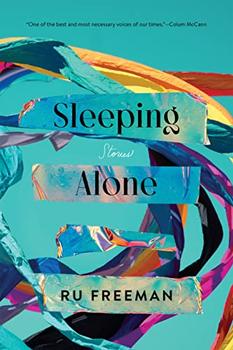Summary | Excerpt | Reviews | Beyond the Book | Readalikes | Genres & Themes | Author Bio

Stories
by Ru FreemanThe Wake
What is truth? This is: Oric Boyar, a former actor, astrologist, voice coach, and charismatic cult leader, convinced his followers to help raise a dead man to life in a New York City apartment, keeping vigil over the decomposing corpse for two months.
The cult, which is what her father called it, and which term she herself feared it deserved, met every week now and only in the Swastika bedroom that she shared with her brother; which is why the corpse also had to lie there.
"Agapito says that this is the only room in which he has felt the divine vibrancies in the whole of New York," Rene, her mother, said on one of the early days.
Did he mean the whole of New York or only the city? And if it was the city alone, did it encompass the boroughs? Had he been in every loft and tenement? Her mother turned away from such questions, particularly when uttered by a husband who had already broken the only butter rule.
"Agapito says that we must eat no fish, flesh, or fowl and we must cook only with butter," Rene had announced one morning. Sylvia, her brother, and their father watched while a week's worth of good groceries went down the garbage chute rigged ingeniously inside the dumbwaiter.
"That is kosher meat!" her father said. Kosher was her father's equivalent of organic. They were not Jewish. Perhaps being the only Italian family in a building full of Jewish families had been the genesis of this preference. Still, despite the considerable pride he displayed whenever he came home having secured some past-best- before from The Kosher Marketplace, he didn't move to stop the waste. He rarely moved to stop her mother from anything, not even the construction of the Swastika Room, which is where she and her brother unfolded day by day. In truth, it fell far short of a real swastika, but her brother, Dickens, had insisted on the name.
"We are the Jews in this family," he had said to Sylvia. "Those two are living life while you and I are merely surviving." Dickens had discovered bitterness when he turned twelve and he was relentless about airing it with a certain theatrical flair.
She understood, Sylvia did, in her forgiving way, that the sleeping arrangement was a necessary innovation. She had been reminded, quite often, that their apartment in Manhattan was both an asset and a mousehole, and that was after her parents had "moved up" and away from the crumbling wasteland of legend and fall that had been their old place: the Marple Tower on Fifty-Seventh Street. And although this move had predated her birth, that history had imbued Sylvia with a certain gravitas that caused her to be zealously grateful for space.
"They need privacy," Rene said, a relatively short sentence for her, as she tore out the sheet of linen paper that she usually reserved for unnecessarily long thank-you notes written in exquisite calligraphy for correspondingly insignificant gifts: a cup of coffee after school with another mother perhaps, or a bag of apples from a dark-skinned student in the fall. She sketched the design in blue Biro.
Dickens had been unimpressed. "We're going to be in a prison, Syl, that's all it is. A prison."
But prison or not, their father hauled lumber up in the same dumbwaiter, the trash held back for a day, and went to work. When he hammered and nailed and grunted and yelped inside their thirty-by- twenty- foot room, Sylvia was disturbed less by the hammering than by the yelps. For a baritone whose voice was his profession, yelps were not becoming. She winced and made untenable promises to unknown deities to spare him the loss of his voice, while her mother paced outside, as though this would hasten completion of the task.
Her mother was a riddle that Sylvia was determined to solve.
Rene, by her frequent account over dinners when her husband was not in attendance, had married into the ephemera of talent and popularity. Sylvia's father, Sansone, had been thirty-five years old and distinguished in the world of independent musical theater, complete with a seasonal directorship at an upstate summer camp for kids with a thirst for the stage. In the eyes of nineteen-year- old Rene, Sansone had seemed a most prudent choice, his professional qualifications only enhanced by the numerous women who lingered at his side. Surely, if he chose her, it had to have been because she presented, and he recognized, a combination of musical gift and youthful beauty in her that surpassed anything or, for that matter, anyone he could commandeer to his side. It was far too late when she realized it had been nothing more than love. By then, Dickens was born, and Sylvia incubating.
Excerpt from "The Wake," from Sleeping Alone. Copyright © 2022 by Ru Freeman. Used with the permission of Graywolf Press, Minneapolis, Minnesota.
Your guide toexceptional books
BookBrowse seeks out and recommends the best in contemporary fiction and nonfiction—books that not only engage and entertain but also deepen our understanding of ourselves and the world around us.